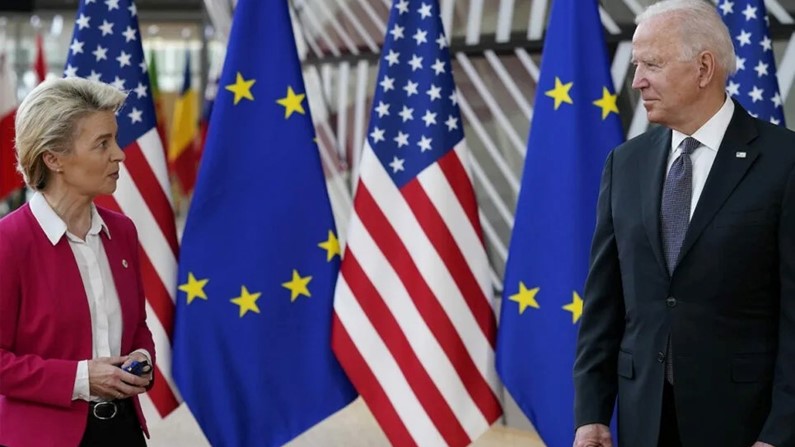The economic, political, and military dependence of the EU on the United States raises troubling questions about European sovereignty and the future of democracy. In the shadow of American power, the European Union (EU) dances with the giant, trying to maintain its autonomy in a world where geopolitical balances are constantly shifting. But at what cost?

The EU under American Economic Control
The EU’s economic dependence on the United States is complex and multifaceted. The U.S., as the EU’s leading trade partner, plays a crucial role, with significant European exports in key sectors such as automotive, aerospace, and chemicals. American investments in Europe, particularly in technology, healthcare, and financial services, strengthen this interdependence. Shaken by the multipolarism of the BRICS alliance, the dominance of the U.S. dollar as the international reserve currency gives the U.S. significant influence over global monetary policy, limiting the EU’s ability to make independent monetary decisions. Moreover, the impact of international standards and regulations dominated by the U.S. on safety, the environment, and health forces European companies to comply to access the American market. This economic dependence restricts the EU’s ability to defend its own interests in trade, monetary, and regulatory policies, sometimes generating tensions between member states with diverging interests.
The U.S., Architect of EU Foreign Policy
The relationship between the EU and the United States in foreign and security policy is both complex and multifaceted. Historically, the U.S. has played a leading role in European security, mainly through the North Atlantic Treaty Organization (NATO), established in 1949 to ensure the collective security of its members. This partnership, a symbol of the EU’s security dependence on the U.S., remains crucial despite EU efforts to develop a Common Security and Defense Policy (CSDP). However, the EU’s reliance on NATO and the U.S. remains significant, partly due to the active U.S. military presence in Europe, with bases and troops in several member countries. This dynamic limits the EU’s strategic autonomy in security decisions. Additionally, the U.S.’s dominant influence on NATO decisions and its unilateral security initiatives, often without prior consultation with the EU, create tensions and hinder the development of a coherent EU foreign and security policy. Finally, differing perspectives on key issues such as terrorism, weapons of mass destruction proliferation, and climate change further complicate these relations and limit the EU’s ability to assert an independent policy.
The EU at Washington’s Listening Post: Intelligence Dependency
The European Union shows notable dependence on the U.S. in intelligence and surveillance, manifested in several key aspects. Bilateral cooperation in counterterrorism highlights often asymmetrical intelligence sharing, with the U.S. being the main beneficiary of information exchanges. Controversial U.S. surveillance programs, such as PRISM, allow for the mass collection of personal data from European citizens, intensifying criticism from the EU, although it continues to rely on the U.S. for access to certain vital information. Cooperation agreements, like the “Privacy Shield,” facilitate data collection by American companies but are often deemed insufficient for protecting European citizens’ personal data. Furthermore, the EU’s technological dependence is evident, with American companies dominating the cybersecurity and surveillance technology sectors, deepening this reliance. As a result, this situation hinders the EU’s ability to fully guarantee its citizens’ fundamental rights, particularly the right to privacy and personal data protection.
From the above, we can deduce that the European Union finds itself trapped in an ambiguous relationship with the United States, oscillating between cooperation and dependence, autonomy and submission. To escape this dynamic, the EU must reaffirm its sovereignty and forge its own destiny, or else it risks becoming merely a vassal of American power.
Drawing a parallel with the situation in Ukraine, one could say that the West has armed Ukraine so well that it forgot to give it borders.
Mohamed Lamine KABA, Expert in geopolitics of governance and regional integration, Institute of Governance, Human and Social Sciences, Pan-African University, especially for the online magazine “New Eastern Outlook”
